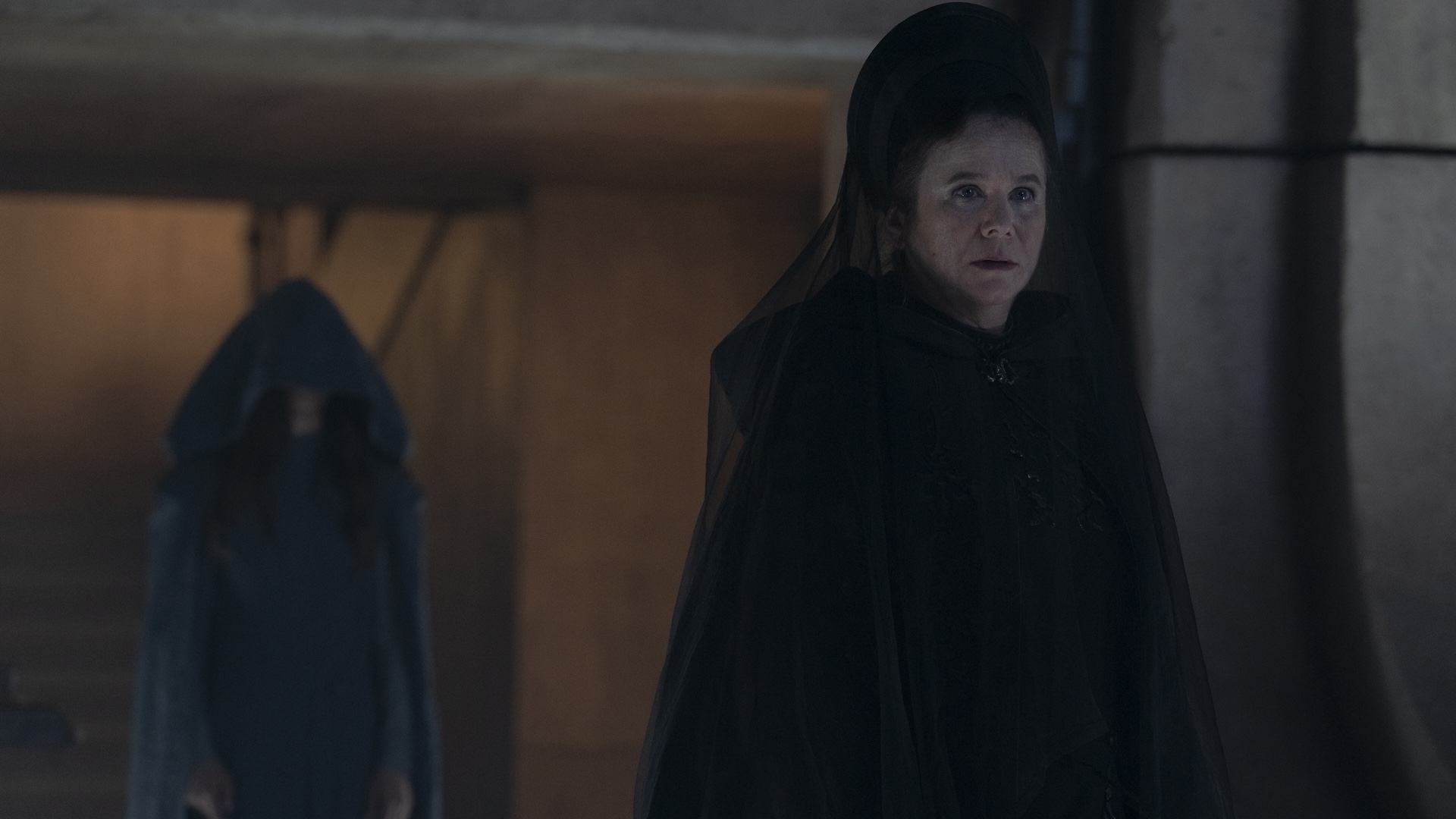
This article contains spoilers for Dune: Prophecy season 1.
“Come princess,” Valya Harkonnen Emily Watson) tells Ynez (Sarah-Sofie Boussnina) in the final scene of “The High-Handed Enemy,” the sixth and final episode of Dune: Prophecy. “The path to our enemy begins here.”
“Here,” of course, is Arrakis, which isn’t a huge surprise. The desert planet has always been at the center of Frank Herbert’s novels. But Dune: Prophecy isn’t based on Frank Herbert‘s work, at least not directly. Instead, it draws inspiration from the expanded universe novels by Frank’s son Brian Herbert and co-writer Kevin J. Anderson, especially the Schools Trilogy.
Prophecy takes place a few decades after those books, in a period not directly explained in any of the novels. As such, we have an idea of where the series will go for season two, but no hard answers. Of course, given the series’ emphasis on schemes and plotters, we don’t want anything more than guesses, attempts to glimpse the secret hand forever lurking in the shadows.
Whose Eyes Do We See In Valya’s Vision?
One of the main drivers of Dune: Prophecy has been the titular prediction, the coming of Tiran-Arafel, who will enact a reckoning on the Sisterhood. For most of the first season, that reckoning has come from Desmond Hart (Travis Fimmel), the abandoned son of Tula Harkonnen and Olly Atriedes. But in the finale, Valya sees inside Desmond’s mind to get a glimpse of the threat.
There, the same glowing eyes that have haunted the Sisterhood changes into scientific equipment that gives Desmond the fear-eating nano-machines he uses to burn people alive, but not much more. There’s a hooded figure running the equipment, but we never see its face.
However, the books do give a few ideas about the person behind the eyes. The idea of a nano-virus, combined with the series’ interest in the use of nano-machines, points to Omnius or Erasmus, major Thinking Machine villains in the prequel books by Brian Herbert and Anderson. Omnius is the collective hivemind of all the AIs in the universe, and did use a virus to debilitate the human armies before the Battle of Corrino. Erasmus started the human resistance when he killed Serena Butler’s child, and still exists in the Mentat School during the Schools Trilogy.
However, the Dune movies take place 10000 years after Prophecy, and there aren’t many Thinking Machines around any more. The powers that be at Warner Bros. may prefer for their TV show to help do world-building for the movies, which would suggest that Ixians or even the Bene-Tleilax transformed Desmond Hart. We’ve heard talk about the Tleilaxu in Prophecy before, an order devoted to genetic engineering, but the Ixians are relatively new (though one did help Keiran Atreides rebellion).
Ixians continue to study technology, despite the fallout of the Butlerian Jihad. As such, they tend to be ostracized from the rest of the universe, which means that they don’t do quite as much plotting as other groups. Still, they do get involved with universal conflicts and play a role in later Dune stories, so they cannot be counted out.
The Folly of Natalya’s Reign
By the end of Prophecy‘s first season, Javicco (Mark Strong) is dead and Natalya (Jodhi May) reigns as Empress, with Desmond Hart as her bashar. On one hand, the change makes sense, as Javicco showed himself to be a weak emperor. But for all of her confidence, it’s not clear that Natalya understands the larger forces controlling Hart, nor that the Sisterhood still plans to put Ynez on the throne.
In short, there’s no sign that her reign will go any better than her husband’s. Like Javicco, Natalya doesn’t really show up in any of the Dune books, which means that the series will have some wriggle room to tell new stories about her. That said, her absence in the lineage also means that she won’t have much of an impact, certainly not enough to tear rule away from the Corrino family.
So while Natalya might get some big victories in season two, she’s ultimately like any other leader in the Dune universe, weak in the face of destiny.
Lila and the Sisterhood
Like Natalya, Lila (Chloe Lea) seems to enjoy a position of power at the end of Prophecy‘s first season. Sort of. Lila isn’t Lila anymore, having died trying to access her genetic memories. She came back less as Lila and more as an amalgam of Raquella, Valya’s teacher and one-time Mother Superior of the Sisterhood, and Dorotea, the rival that Valya murdered.
In “The High-Handed Enemy,” we see Dorotea in primary control, but instead of chasing after Valya, she spends her time gathering acolytes to her anti-Thinking Machine beliefs. Going all the way back to Frank Herbert’s books, the war against the machines has always been described in more ideological and dogmatic terms than in military terms, even as the prequel series made it literal. So it does track that the series would deal with belief instead of action.
However, the books tend to portray those beliefs as self-consuming, too rigid for their own good. Lila may be able to gain strength in the Sisterhood by stoking the fires of Butlerian fears, but it’s hard to believe that will give her long-term power, especially when the other Sisters discover the Thinking Machine Anirul hidden on Wallach-IX.
What Is Valya’s New Plan?
For as much as she talked about pieces on the board and other schemer metaphors, Valya kind of sucked as a strategist. So it’s no surprise that she ends up losing in season one of Prophecy, escaping to Arrakis with Ynez and Keiran.
Valya still wants to put a Sister on the throne, namely Ynez. Even though she’s now segregated from the rest of the Sisterhood, she likely has some true believers who can help her, but nothing like her cohort before. She even lost her face-dancing acolyte Theodosia, one of her more versatile allies. Still, she has Ynez and connections enough to continue working toward that goal, even on the desert planet.
The bigger question is about her other plan. Although she began the series saying that she wanted a Sister as Emperor, continuing Raquella’s dream, Valya spent most of the season plotting the downfall of the Atreides, an anger fueled by what she considers a betrayal by Vorian Atreides. The last episode involved a vision of her beloved brother Griffin blaming her, and not Vorian, for his death. And she does have Ynez’s lover Keiran Atreides with her on Arrakis, so perhaps that quest is done.
Then again, you can never tell with Valya.
Will Salusa Secundus Survive Season Two?
As we’ve said, Dune: Prophecy takes place largely in a no man’s land between books. That space allows the show to carve out its own storylines, but it is bound by explicit events before and after the show’s present.
Which isn’t a bad thing. While Prophecy wants to tell its own stories about its own characters, it also wants to have some of the weight that comes from connections to major events in the Dune mythos. The biggest event available with them is the destruction of Salusa Secundus. As seen in the show, Salusa Secundus is the seat of the Corrino empire, a beautiful and verdant planet befitting the ruler of the known galaxy. But in Herbert’s Dune and in the movie adaptations, Salusa Secundus is a rainy wasteland, where the Sardaukar grow stronger by training in its harsh environment.
What happened? The books don’t say, exactly. We’re told that House Tantor goes rogue during the reign of Hassik Corrino III and uses atomics against the planet, effectively destroying it. But there’s enough hearsay and wriggle room for Dune: Prophecy to put a slightly different spin on the events.
Will Natalya’s reign and Valya’s move for Ynez bring things to such a boil that they get House Tantor to do the unthinkable? Will history misremember Desmond Hart’s powers as atomics, hiding the fact that he did the attack? Will Desmond’s secret masters reveal themselves, resulting in the destruction of the planet?
These are huge questions for Dune: Prophecy to work with in its second season.
All of Dune: Prophecy season 1 is available to stream on Max.
The post Dune: Prophecy Finale Teases a Major Arrakis Storyline for Season 2 appeared first on Den of Geek.











